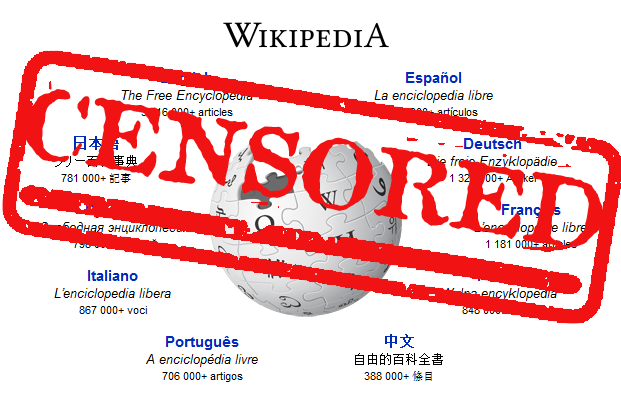Would a Wikipedia blackout be such a bad thing?

Are you a student who relies on Wikipedia for research inspiration, or uses the contribution-based encyclopedia as a source for your coursework?
Enjoy using it while you can -- it may not be long before Wikipedia takes a break from the web.
Wikipedia founder Jimmy Wales has asked for user opinion on a potential Wikipedia blackout in protest of the proposed SOPA bill being debated in Congress. The SOPA bill would give U.S law enforcement powers to strip and take down websites that are seen to either contain copyrighted material, or facilitate copyright infringement.

There are no immediate plans for Wikipedia to blackout. Wales is using a straw poll to gauge reaction and interest. It is currently not a vote on whether or not to have a strike.
The Italian parliament backed down on piracy law legislation when the Italian version of Wikipedia staged a protest and took all of its pages offline. Now, the English language version of Wikipedia may follow suit.
What are some of the arguments staged by Wikipedia users for and against a Wiki-Hiatus?
Reasons for a blackout
"What it will do is cripple free speech, Internet security and kill jobs in one of the few sectors of the U.S economy that is flourishing."Many advocated cited free speech, security and economic growth in their arguments. Some even went so far to suggest collaborative efforts between web giants such as Wikipedia, YouTube and Facebook.
A continual theme in those that advocate a Wikipedia blackout is the ability to promote public awareness of the SOPA bill. By taking down Wikipedia, apart from extending how many internet users become aware of the issue, it could be considered a demonstration of what the legislation could achieve in the future.
It could change the face of online networks as we currently know them.
There is concern over Wikipedia entering political territory. But with a bill that may threaten the encyclopedia's survival, Wikipedia does have the right to an opinion and to use its own platform to express it.
An interesting point made by an Australian supporter was the Free Trade Agreement between the U.S and Australia. They suggested that should the bill passes, it won't be long before Australian legislation will take on SOPA in some form.
Considering the links that the U.S government has across the globe, it isn't a likely prospect that only the Australian government will be ones to alter their legislation in reaction to SOPA.
Reasons against
"Until such a time as someone with proper legal training can explain, cogently, whether and to what extent this will affect Wikipedia in a material way, I oppose it."A reason some users of Wikipedia are against the blackout is the concern of Wikipedia shifting from a politically neutral stand. Wikipedia is an encyclopedia and not a platform for political advocacy, and by voluntarily blocking access to the website it is not sticking to its ideals of remaining politically neutral.
This in turn could worry users and editors about contributing to a website that suddenly has a political agenda. With no current certainties on how Wikipedia would be affected by SOPA, it may be a case of 'jumping the gun' before solid research can be completed.
Another reason for rejecting this idea is simply the need that people have for Wikipedia. Some users worry that a blackout will affect their daily work.
It was proposed that Wikipedia, if they decide to take a political stance on a bill that could affect their future survival, should instead consider methods such as banners or campaigns on the site instead of complete removal.
Others suggested that the proposed 'block' should only be placed on Americans, and avoid affecting the access of international users. An opinion expressed suggested that 'legislation in one country is not enough reason to close the site internationally'.
However, SOPA is not legislation that will be confined within U.S borders.
How could SOPA affect Wikipedia?
Wikipedia, in the same way as other influential online brands like Facebook and Twitter, relies on user-generated content. It is therefore in the same danger bracket if SOPA legislation sinks its teeth in to the online encyclopedia.The proposed laws are not clear-cut.
As one debater noted, Wikipedia is probably riddled with copyright violations. Unless Wikipedia was willing to spend an enormous budget -- for which it doesn't have -- regulating and checking every contribution, it probably wouldn't be able to survive in the online world of SOPA.
It seems to be an opinion in other countries than the U.S that the enforcement of this legislation wouldn't affect international sites. The U.S based company Verisign controls the .com, .net, and .org registries -- which in turn makes SOPA an immediate, global issue, and not one purely restricted to U.S websites.
If the SOPA bill is passed in America, it is likely that other governments will follow suit.
The discussion prompted by Wales' straw poll has prompted interesting debate. A Wikipedia blackout could be used to promote knowledge of the proposed legislation, and allow internet users in other countries to become more aware of how the bill would eventually affect them.
Because it will. SOPA is not a U.S website central issue -- it is a global concern.
However, the risk Wikipedia takes is moving from a politically-neutral platform.
If Wikipedia is willing to do this in order to protest legislation that may affect them, then perhaps using a blackout as a last resort may be a more sensible option. Or, on the other hand, staging a potential 'future Wikipedia scenario' now might contribute to changes in the legislation before it's too late.
If the SOPA bill does come in to play, Wikipedia may end up on more than a voluntary, short-term blackout.
Related: